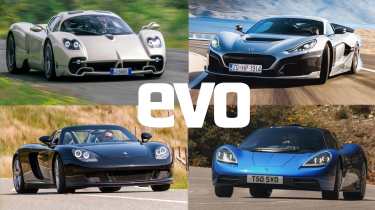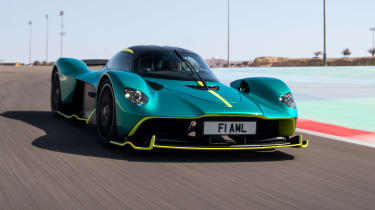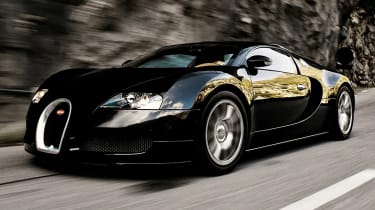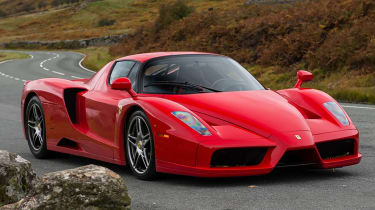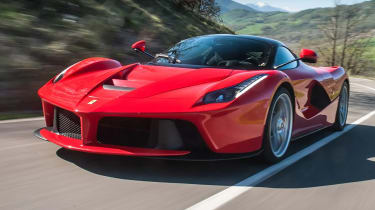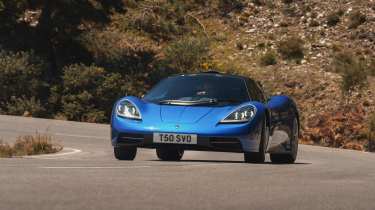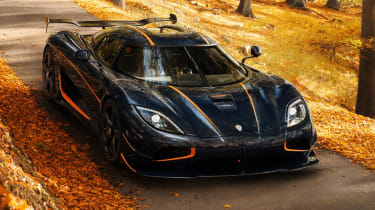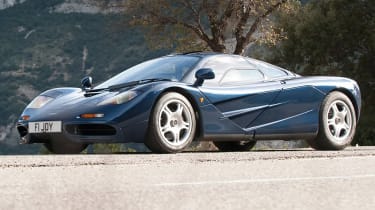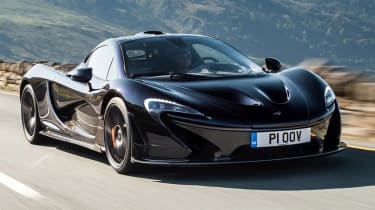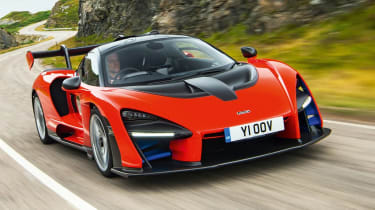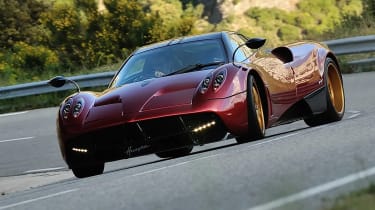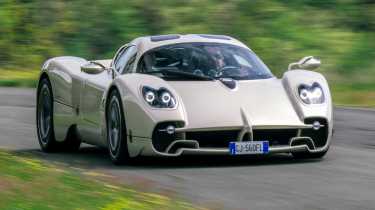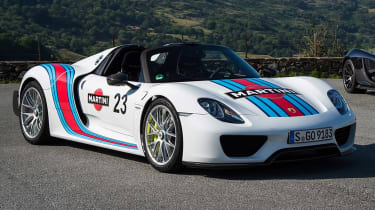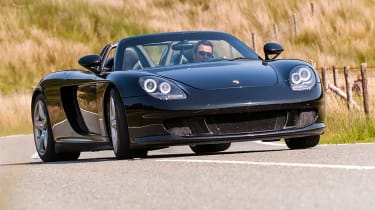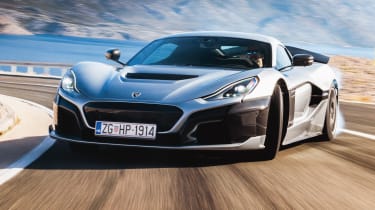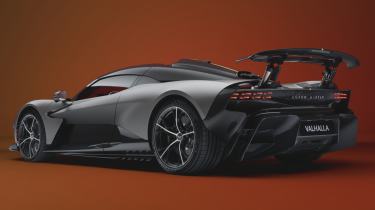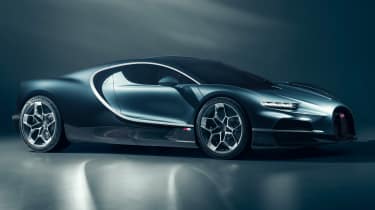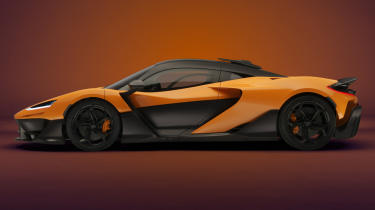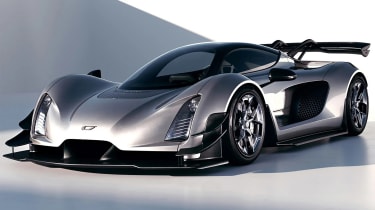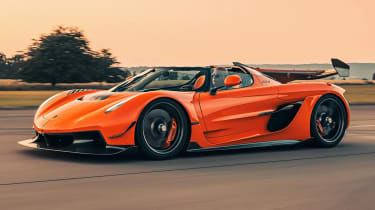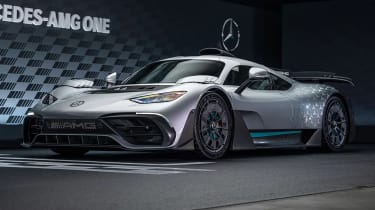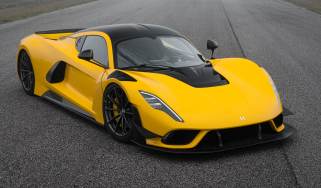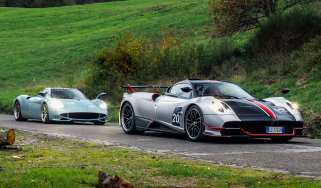Best hypercars 2025 – the ultimate dream cars
Fastidiously engineered and breathtakingly fast, these are the finest hypercars of all time
With concerns about emissions and the march towards EVs, you might wonder whether the traditional hypercar is living on borrowed time. Indeed, you could well conclude that it has been ever since the McLaren F1 burst onto the scene, but fortunately this doesn’t seem to be the case. Hypercars are currently enjoying something of a renaissance with our first drive of the Pagani Utopia demonstrating that the genre is very much alive and better than ever.
Hypercar buyers have never had it so good, with manufacturers embracing more modern and race-derived technologies to ensure the current crop of top-tier models are just as desirable and mind-bogglingly fast as we’ve come to expect. Following the likes of the Aston Martin Valkyrie, Mercedes-AMG One and GMA T.50 rewriting what's possible for road cars today, there’s more to come. A new round of next-generation hypercars awaits, with the McLaren W1, Ferrari F80 and Aston Martin Valhalla waiting in the wings ready to unleash their hybrid V8s and V6s on the road for the first time. The thunderous rumble of Bugatti’s next hypercar, the Tourbillon, with its astonishing Cosworth V16, won’t be far behind them. Read on for a list of our favourites from past and present.
Best hypercars
- Aston Martin Valkyrie
- Bugatti Chiron
- Bugatti Veyron
- Ferrari Enzo
- Ferrari LaFerrari
- GMA T.50
- Koenigsegg Agera RS
- McLaren F1
- McLaren P1
- McLaren Senna
- Pagani Huayra
- Pagani Utopia
- Porsche 918 Spyder
- Porsche Carrera GT
- Rimac Nevera
Aston Martin Valkyrie
When Aston Martin announced its intentions with the Valkyrie in 2016, the motoring world just about stopped in its tracks. We’ve seen game-changing hypercars before, but the Valkyrie appeared to be orders of magnitude more ambitious and more capable than anything that had gone before. Its Cosworth-derived 6.5-litre V12 pairs with a hybrid system to generate 1139bhp on its way to an 11,000rpm rev limit, with an initial projected weight figure of just over a ton. But these raw numbers are a very small part of the Valkyrie story.
Adrian Newey designed a skeletal, shrink-wrapped body around that V12 and a two-seat cockpit, which was said to produce an astonishing 1800kg of downforce for LMP1-like track performance. We’ve now driven the Valkyrie, and while its difficult birth has seen these claims substantially neutered (the production car is capped at 600kg of downforce), there is no road car like it.
‘At first everything feels like it’s happening too fast, but the trick is to look further and further ahead’, noted Dickie Meaden. ‘It feels unnatural, but it’s all part of the recalibration process. One that you gradually get on top of, but with less time to relax on the straights and so much compressed into each braking effort, the Valkyrie is a ruthless and relentless test of your focus and mental stamina.’
Bugatti Chiron
Hypercars are all about numbers, and those that the Bugatti Chiron generates are staggering. Sixteen cylinders, four turbos and up to 304mph, Bugatti has remained right at the cutting edge of performance car engineering with the Veyron’s successor, which blew us away when we drove it in 1578bhp Super Sport guise for issue 307 of the magazine.
‘You can push and sometimes even party a bit with the Chiron, and it doesn’t bite, doesn’t get wild’, said Steve Sutcliffe. ‘Instead it flows from corner to corner on a tsunami of torque and poise, its thunderous sequentially turbocharged W16 engine providing you with a constant source of temptation. It will fire you out of any corner and down any straight with three times more energy than you’ll ever need, or sometimes even want.’
This sense of excess defines most hypercars, but especially the Chiron Super Sport. It dispatches 0-62mph in 2.4sec before smashing through 124mph less than four seconds later. Blend this with a fully adaptive chassis and it has an unexpected level of agility, with more connection through the steering than the Veyron could ever muster. The overriding impression is of speed and pure unadulterated performance, with our only gripe being that there’s hardly anywhere on the planet you can meaningfully exploit its potential.
Bugatti Veyron
When VW Group announced it would be building a 1000 horsepower car with a top speed of over 250mph, the world thought it had gone mad. Predictably, the Veyron had a difficult gestation period, but when it arrived in 2005 it rewrote the hypercar rule book in a stroke. Its 1001 metric horsepower equated to 987bhp, good enough for a 2.5sec 0-62mph time and a top speed of 253mph. There was more to come though as the Veyron Super Sport upped the ante to 1183bhp, and until late 2017, it was officially the world’s fastest production car with a 267.856mph maximum.
The Veyron was undoubtedly a technological tour de force – it might have been a less emotional machine to drive than those from the established Italian marques, but it comprehensively outgunned them in straight-line ability. While perhaps not as engaging as its successor, you could forgive the Veyron for any shortcomings once you’d experienced its mind-bending acceleration.
Ferrari Enzo
The Enzo was the distilled essence of Ferrari’s V12 heritage, the last of a line of naturally aspirated V12 models with flagship performance figures. Combined with its 1365kg kerb weight, 651bhp helps it reach 62mph from standstill in only 3.7sec, with top speed coming at 217mph.
Straight-line performance wasn’t the key, though, with the way the Enzo goes about its business on the road most impressive. The engine’s spine-tingling in both its noise and throttle response, with the transmission thumping you in the back with each new ratio, violent enough on down changes to send the car sideways. Its front end is tenacious, too, and while it can snap into oversteer on the limit it’s not vicious and can be caught without breaking into too much of a sweat, even if its steering isn’t quite as telepathic as that of its Carrera GT contemporary.
Ferrari LaFerrari
The Ferrari LaFerrari made up the third prong of the hypercar ‘holy trinity’ with a potent mix of good old-fashioned internal combustion engine and an electric motor. Though not quite a match for today’s electric offerings, headline figures are mouthwatering. Its 6.3-litre V12 revs to 9250rpm and develops 789bhp and 516lb ft of torque, with the electric gubbins adding an additional 161bhp and 199lb ft (664lb ft combined).
With active aerodynamics, Brembo carbon-ceramic brakes and a range of F1-derived technology, the LaFerrari is a hoot to drive with transparent steering and a perfectly judged blend of grip and handling that actually makes it remarkably driver-friendly.
GMA T.50
The T.50 is a modern take on the spellbinding formula set out by the McLaren F1, with the same Gordon Murray genius behind it. Built with cutting-edge materials, manufacturing techniques and technology, the T.50 is designed to be the ultimate analogue hypercar, one that (literally and figuratively) puts the driver at the centre of the experience.
At its core is a bespoke, Cosworth-developed 4-litre naturally aspirated V12. With peak power of 641bhp coming at a mind-boggling 11,500rpm, and the red line not until 12,100rpm, this is no ordinary hypercar. Just as impressive is the kerb weight: 986kg with fluid included. Did we mention it has a manual gearbox?
The result is just about the most visceral, multi-layered and absorbing driving experience you can imagine. 'I’ve never known acceleration so addictive', said our man Henry Catchpole. 'It doesn’t have the beautiful, rich induction sound of a McLaren F1 but its frenzied fierceness, like VTEC on fast forward, makes the hairs stand up on the back of your neck every time you crack the throttle. But the rest of the car isn’t just a vessel for the V12, the chassis is fun and lets you feel like you can truly use the engine rather than just experience it.'
Koenigsegg Agera RS
First it was the McLaren F1, more recently there was the Bugatti Veyron Super Sport and then it was the turn of the Koenigsegg Agera RS. Though now eclipsed by the US-made SSC Tuatara, the Agera RS achieved a 277.87mph two-way average to make it the fastest production car in the world. Bugatti achieved 304mph with the Chiron, but that car was modified for the attempt.
At its heart is a 1150bhp, 944lb ft 5-litre V8 fed by a brace of turbochargers, surrounded by a carbon and aluminium honeycomb chassis. The shapely body is constructed from carbon and Kevlar, too, but despite the exotic stats, it’s relatively practical for a hypercar with a removable hard-top and an almost useable 150-litre luggage compartment.
McLaren F1
The original, and some might argue, still the best, it’s almost impossible to believe that the McLaren F1 is now over 30 years old. It was designed to be the world’s ultimate road car and Gordon Murray’s design brief was exacting, with a fastidious weight-saving philosophy. It’s virtually devoid of driver assistance systems – there’s no power steering or traction control – and it’s very much an analogue machine compared to today’s digital offerings.
Initially Honda power was expected, which would have been a good tie-in with the McLaren Formula 1 team, but Honda declined to design an engine, so Murray turned to BMW who developed a 6064cc V12 that developed 627bhp and 479lb ft of torque.
Its styling was relatively conventional but it was certainly slippery – good enough to allow that V12 to famously propel it to a 240.1mph top speed. By today’s standards the F1 feels a little soft in its suspension but that doesn’t take away from its legendary status. This was the original hypercar and one that has stood the test of time better than most – it can still teach today’s machinery a thing or two…
McLaren P1
Where the legendary F1 was a product of an analogue age, the P1 moved the game on in terms of construction and its hybrid powertrain. At its heart is a 727bhp 3.8-litre twin-turbocharged V8, assisted by an electric motor for an output of 903bhp and 664lb ft, enough for a 2.8sec 0-62mph time and 0-124mph in just 6.8sec.
There’s so much more to the P1 than outright speed, though. Everything on the P1 is designed to enhance its performance, with McLaren’s clever Race Chassis Control active dampers providing the car with superb control and responses and a remarkably smooth ride.
It looks dramatic, too, has an F1-inspired carbon and Alcantara-swathed interior and just about the only downside to the whole package is a modicum of lag from the V8 that the electric motor occasionally struggles to disguise.
McLaren Senna
The Senna is a hypercar in a different form to many on this list, targeting lap times as opposed to outright speed. Given that McLaren saw fit to give it the name of one of the greatest ever Formula 1 drivers, it didn’t go about the process by halves.
We’ve seen track-orientated supercars and hypercars before, of course, such as Ferrari’s XX line, but the Senna remains road legal. Slotting into McLaren’s Ultimate Series, much like the P1, Elva and Speedtail, its low weight and enormous levels of downforce have been designed to maximise its abilities on a circuit.
McLaren claims up to 800kg of downforce at 155mph, well shy of its 211mph top speed, while a dry weight of 1198kg makes it roughly equivalent to a Lotus Exige – but at 789bhp, more than double the power. It’s intense, involving and very capable, though it’s fair to say it also doesn’t quite have the bedroom wall aesthetic appeal of some of the other cars on this list...
> 2023 McLaren 750S revealed as new flagship supercar
Pagani Huayra
The Zonda was always going to be a hard act to follow, but with the Huayra, Pagani managed to combine a new turbocharged engine with the suppleness that was always one of the Zonda’s crowning features. The AMG-sourced 6-litre V12 offers 720bhp and 737lb ft in its standard form, and as the Huayra weighs just 1350kg dry, it’s guaranteed to be quick – 0-62mph takes 3.3sec and top speed is 224mph.
There’s real drama to the Huayra’s looks and it’s significantly more cohesive in the flesh than in pictures. Then there’s the slightly bonkers interior – a wonderful amalgam of aluminium, carbon and leather that will no doubt be slightly over the top for some tastes but it’s undeniably dramatic.
Performance, traction and grip levels are simply stunning, but in the wrong hands it could be a wayward companion as the transition from grip to slip is relatively brutal and not entirely progressive.
Pagani Utopia
Improving significantly on the Huayra was always going to be a tough ask but with the Utopia Pagani has unleashed an even more capable and complete hypercar. Horacio Pagani’s Utopia is a £2,200,000, 1280kg, 217mph, 852bhp twin-turbo V12-powered confection of advanced composites and exotic alloys.
The engine is a masterpiece and it’s linked to a sweet-shifting seven-speed manual ‘box to give the driver a further level of interaction. Despite having the requisite number of modern trappings – adaptive dampers, electronic stability control and an e-diff – the Utopia has a gloriously analogue feel and involves the driver like few other hypercars. The acceleration is explosive but it’s the precision of the steering and the exploitable handling that really grab your attention while the supple suspension works in perfect harmony with the rest of the machine. The world’s most complete hypercar? It could just be…
Porsche 918 Spyder
With ‘only’ 599bhp and 398lb ft developed by its glorious 4.6-litre V8 you could be forgiven for thinking the Porsche 918 Spyder would be a little outgunned in this company. Add in its two electric motors, though, and the 918 is right up there with a combined 875bhp and a staggering 944lb ft of torque, and it’s that latter figure that stops the 918 Spyder from being significantly outgunned by the other two members of the ‘holy trinity’.
It has the performance – 0-62mph in 2.6sec and 0-124mph in 7.2sec – but with the 918 Spyder it’s the seamless way that the four-wheel drive, sublime PDK transmission, twin electric motors and majestic V8 work in combination that makes it such an enjoyable drive. The 918’s dynamic ability is equally impressive, with a brilliant EPAS set-up and perfectly judged PASM dampers giving you complete confidence in the car.
Porsche Carrera GT
Headline figures of 604bhp and 435lb ft of torque might sound a little conservative today, but when the Porsche Carrera GT was launched they were right up there with the best. Its 5733cc mid-mounted V10 was derived from its Le Mans prototype racers and the rest of the car was equally cutting edge.
Inboard suspension componentry, a handcrafted carbon engine cradle and an electrically deployed rear spoiler made it truly game-changing. Despite this, its design is pleasingly understated, with its cabin lacking the divisive frills of some rivals.
Drive the Carrera GT hard and it will reward, with mind-boggling throttle response, a forgiving chassis and communicative steering. The further and the faster you drive it, the more you’ll find layers of ability that weren’t apparent on first acquaintance and a level of dynamic polish that set the hypercar standard.
Rimac Nevera
There are more (proposed) electric hypercars than we can count, but the Rimac Nevera is the only offering that so far deserves a place on this list. Launched as successor to the Concept One and the first true next-generation hypercar, it boasts performance that its combustion counterparts simply can’t match, proving to be both the fastest accelerating production car and the world’s fastest EV with a 258mph top speed.
Each wheel is powered by its own electric motor, allowing for near infinite adjustability in terms of power distribution and some nifty electronic stability tricks, too. Combined output stands at 1888bhp, making it the most potent on this list, with its 1740lb ft torque figure perhaps even more mind-boggling.
With Rimac now supplying technology and expertise to everyone from Porsche to Hyundai, it’s no surprise that the firm has managed to produce a very well resolved driver’s car. Despite its ludicrous performance figures (and 2150kg weight), it boasts incredible dynamics that make it more exploitable than its numbers would ever suggest.
The hypercars we’re most excited to drive
Aston Martin Valhalla
It’s been a long time coming but the Aston Martin Valhalla, Gaydon's first plug-in hybrid hypercar, is almost with us. The car that was originally dubbed Son of Valkyrie has taken a different path to the Cosworth V12-engined Le Mans challenger using a mid-mounted turbocharged V8 coupled with three electric motors and a small battery pack.
Aston’s claimed performance figures are impressive with a combined output of 1064bhp and a torque peak of 811lb ft leading to a 2.5sec 0-62mph time and a top speed of 216mph. There’s a planned production run of 999 examples despite the £850k price tag, but will it be special enough to justify its hypercar tag? We can’t wait to sample it to find out.
Bugatti Tourbillon
Following in the footsteps of Veyron and Chiron and replacing in spectacular style, the long-serving industrious W16 quad-turbo engine, is the Tourbillon, with its 8.3-litre Cosworth-developed V16, good for 9000rpm and 986bhp (Veyron power) on its own. But of course, being a child of the new Bugatti-Rimac era, the Tourbillon also features electrification, so three electric motors (two on the front axle, one at the rear) bump the total power figure to a dizzying 1775bhp.
Just 250 Tourbillons will be made but even with what is a sturdy €3.6 million price tag, they're all sold. Videos of the prototype testing reveal a hypercar with the soundtrack of a 1930s grand prix racer and we simply cannot wait to experience it for ourselves. Watch this space.
McLaren W1
The next chapter in McLaren’s ‘1’-badged hypercars is the McLaren W1 and judging by its specification, it’s going to be a bit of a belter. It’s a completely fresh design with nothing being carried over from the P1 or from the existing model line-up and as is the way with modern hypercars it majors on aerodynamics and a monster hybrid powertrain.
It might share a similar configuration to the P1 but the W1’s MPH-8 4-litre V8 is all-new and delivers some headline-chasing stats: 915bhp and 664lb ft. Add the hybrid components and the total comes up to a mouthwatering 1257bhp and 988lb ft of torque. Good enough for a 2.7sec 0-62mph time, 0-124mph in less than 6sec and a top speed limited to 217mph. We’re looking forward to opening its gullwing doors and seeing how it shapes up.
Ferrari F80
The F80’s name celebrates Ferrari’s upcoming 80th year and lifting elements from Le Mans and Formula 1, it’s the firm’s quickest and most complex road-going model to date. Its vital stats include an 1184bhp output, with 888bhp of that being developed by its 3.0-litre V6 – yes, despite continuing with the V12 in some of its ‘normal’ road cars Ferrari’s headlining model will have just six-cylinders.
The hybrid system uses both MGU-K and MGU-H systems to recover energy from the electric motors and new, enlarged electrically assisted turbochargers. There’s a carbon chassis, enough aero to deliver over a ton of downforce at 155mph and carbon ceramic brakes. Oh, and it will lap Fiorano 4.4sec quicker than the LaFerrari.
Czinger 21C
Built by fledgling US firm Czinger, the 21C takes a unique approach to the hypercar, with a bespoke mid-mounted turbocharged 2.88-litre flat-plane crank V8, cutting-edge manufacturing techniques and a tandem seating position. There’s even a V Max variant in the works which is targeting a 253mph top speed.
Producing 1250bhp in standard trim, it certainly has the numbers to match its hypercar rivals, but the use of additive manufacturing and advanced composites help make it shockingly capable on the circuit. Czinger lapped Laguna Seca in a record-breaking 1min 25.44sec, beating the previous production car record holder, the McLaren Senna.
Koenigsegg Jesko
Successor to the Agera, the Koenigsegg Jesko adopts a new in-house nine-speed Light Speed Transmission, a revised carbon tub and an overhaul of the firm’s trademark 5-litre turbocharged V8. Though it's yet to make an attempt, the marque claims its low-drag Absolut variant will hit 310mph, a speed which would make it the fastest production car in the world.
Specs are typically Koenigsegg, with 1578bhp and 1106lb ft of torque sent to the rear wheels alone (on E85 race fuel). Transmitting this power to the ground is the new transmission, utilising multiple clutches to allow for what Koenigsegg calls ‘near light speed’ shifts – unlike a dual clutch system, this eliminates the need to run through each gear during acceleration.
The new carbon tub aims to offer more practicality than before, too, with an increase in cabin space, and in standard 'Attack' form the Jesko will produce an impressive 1000kg of downforce.
Mercedes-AMG One
It's taken quite some time, but the Mercedes-AMG One has at last come to fruition, with production finally under way in Coventry. Proving its worth with a record-breaking 6min 35.183sec Nürburgring lap time, the F1-derived hypercar is perhaps one of the most ambitious offerings we've seen to date.
Utilising a development of the 1.6-litre V6 hybrid powertrain lifted straight from its Formula 1 program, the One produces a strong 1048bhp, enough for a 2.9sec 0-62mph time and 219mph top speed.
Figures aren't awfully impressive for a £2.5million machine, with its 1695kg weight figure likely dampening its numbers, but it's a fascinating thing nonetheless, and one we’re unlikely to see the likes of again.

